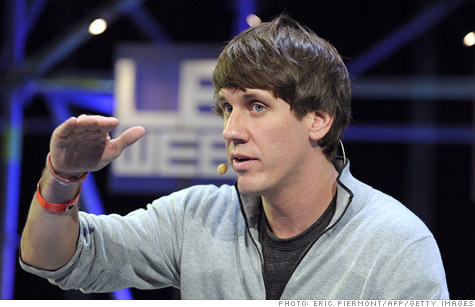Search News

Foursquare CEO Dennis Crowley at a conference in December 2011.
BARCELONA, Spain (CNNMoney) -- Foursquare CEO Dennis Crowley knows people think his location-based service is about a bunch of dorky teens and twenty-somethings running around and collecting virtual badges.
But he also knows something that we don't: The load of information that his company is collecting from its league of nerds is a potential goldmine of data.
"Everyone thinks of Foursquare as check-ins and badges," said Crowley at a keynote address at Mobile World Congress in Barcelona on Wednesday. "No, no. We're recycling data and making recommendations for the real world."
Crowley said the 15 million global Foursquare users have checked in 1.5 billion times. With such a critical mass of data, the company is developing the ability to become the Amazon (AMZN, Fortune 500) of locations: Serving up recommendations for places you would probably like to visit based on your profile and check-in history.
All this stems from Foursquare's growing competence in contextualizing user-generated data. For instance, the app can tell a sushi-loving New Yorker who just landed in Barcelona the location of the best Japanese restaurant in the city. It can also connect the user with other users from New York that just arrived in Barcelona.
"We can give all this data back to people to make their lives a little better," Crowley said. "We're starting to get really good at figuring out what the context is."
That ability to parse data is also key to its monetary strategy. For instance, Foursquare is beginning to break down that data for local businesses, selling them a breakdown of what types of customers visit their stores, and how their foot traffic compares to their neighbors and local competitors.
But Crowley envisions Foursquare growing beyond its reliance on check-in data. He said permission to scan across a user's social network could yield some even richer recommendations for users.
In the near future, Foursquare users may get an alert on their phones when they pass by a store that carries an item on their Amazon wish list. Or they may get a notification when they are approaching the location of a restaurant review that a friend sent them on Facebook.
"People think stores' advertisements for 'check-in in, get a free beer' is dorky," said Crowley. "But check-ins drive the data, which drive the recommendation engine. It's really great stuff."
A potential threat to Foursquare's efforts is that they have been mimicked by Internet giants like Google (GOOG, Fortune 500) and Facebook, which recently bought Foursquare rival Gowalla. Nokia (NOK) CEO Stephen Elop even announced his company's own attempt at a location-based platform at the same keynote address in Barcelona Wednesday.
Elop said Nokia is investing in tools like augmented reality and indoor mapping. The company is combining that with its already robust mapping services to create a universal, open location platform.
"As it relates to applications, the world will go local," said Elop. "People can expand and develop upon locally relevant applications. The result will be a shift in profits, from a small number of firms that make a lot of money to one where a lot of people make money."
But Crowley noted that Foursquare's user base is still rapidly expanding despite growing competition.
Foursquare's platform is also open, with an application programming interface that anyone can tap into. Popular apps like Instagram and Path use Foursquare's API to serve up location-based data, and The New York Times' restaurant and travel reviews have a "send to Foursquare" button.
"Our ability to cut through the data stream allows us to have a competitive advantage," Crowley said. ![]()